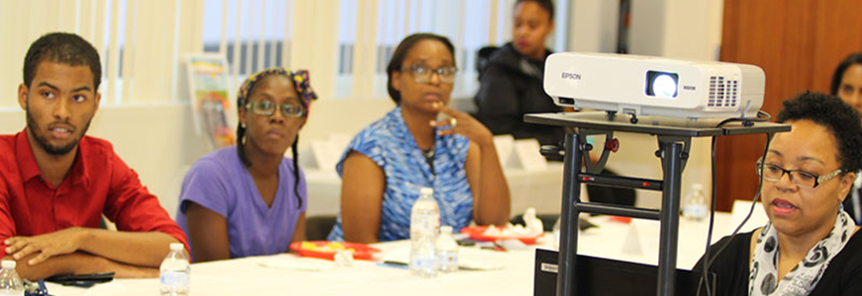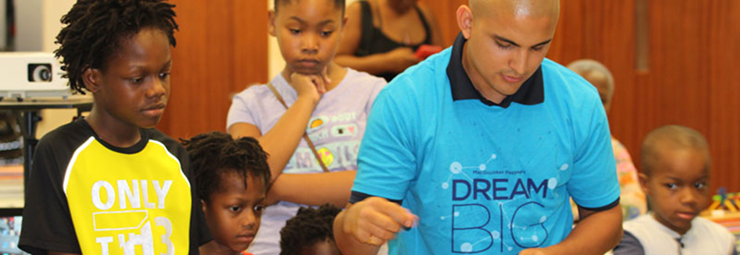A community dialogue framework for public libraries & other informal learning institutions
Informal learning institutions often have goals of reaching underserved and underrepresented audiences, as well as soliciting user feedback about their venues and programs. Unfortunately, sometimes community members do not feel welcome in certain institutions or may not even know they exist. Working closely with public libraries across the country, the STAR Library Network (STAR Net) has developed a Community Dialogue Framework to assist public libraries in reaching new patrons, becoming an even more welcoming venue, and building new partnerships. And while initially developed for libraries, the National Center for Interactive Learning (NCIL) team believes the Framework could be useful for science centers, museums, maker spaces, zoos, aquariums, and other informal learning institutions.
STAR Net is a project of NCIL at the Space Science Institute, and is funded by the National Science Foundation (NSF).
Public Libraries and STEM
Libraries see themselves as poised to help meet the STEM needs of their community and serve very large portions of their community (approximately 78% of people have used their public library before). A participant from a past NCIL program, Discover NASA, summed up the role of libraries in facilitating STEM in their community, saying, “Public libraries are a pillar of education for all. We have an opportunity and a responsibility to offer educational experiences for our communities. STEM learning is part of this and highly important for the continued development and health of our society, both intellectually and economically.”
Project Development and Implementation
Community Dialogues are informal, flexible conversations between staff at the convening institution and leaders in the local community. Unlike focus groups, where you may be testing a product or a new idea, these Dialogues instead are gauging your community’s opinions on your venue and the services your community wants and needs.
The initial concept was developed as part of the National Institutes of Health-funded Discover Health/Descubre la Salud exhibition program in Colorado that utilized extensive community input to design a health-based exhibition relevant for the Spanish-speaking community in Colorado. These early Dialogues at eight Colorado libraries involved a staff member from NCIL, library staff, and members of the Colorado Area Health Education Centers. Some venues began inviting more community members to these conversations (such as tribal leaders, immigrant services, local physicians, and teachers), and the project team realized that the Dialogue framework was more valuable than we had initially realized. Because of these conversations, Discover Health libraries created new signage, began new programs with local tribes, and gained dozens of new partners.
The Framework was further refined as part of the NSF-funded Project Build and the NASA-funded NASA@ My Library programs. Several resources and supports were developed in this iteration including creating a guide for participating libraries, expanding the suggested invitee list, and assisting libraries in creating plans to follow up on the requests, suggestions about programming, and lessons learned from previous Dialogues.
As we’ve developed the Framework, we’ve realized that this model is so much more flexible than we originally thought. Facilitators really just need to get people to their venue, and then the conversations flow naturally (and quickly). Charles Diede of the Fontana Library in California noted after his Dialogue that “Participants took off running. I was barely able to get questions in, but it was all good because by themselves they covered most of the questions!” Mary Jenkins, of the Clarksdale Carnegie Public Library in Mississippi, echoed that sentiment, saying that “This Dialogue was very useful in setting up collaborations. The attendees weren’t as keen on discussing issues as they were on talking and working together!”

Adapting the Framework for Other Settings
Can other informal learning institutions have the same success as public libraries? The team at NCIL, as well as the libraries who’ve participated in these Dialogues, believe the answer is a resounding yes! On the Community Dialogues webpage, informal learning institutions can access and adapt the guides, templates, and information from a library setting to their own.
Don’t forget to include your public library in these conversations, preferably in the early planning stages! Libraries have a pulse on community needs, access to community members, and are seen as a trusted community resource. Museums, for example, might consider hosting their Dialogues at a library to truly gather diverse opinions from the larger community. Be prepared to hear some hard truths. Not everyone will see your institution as welcoming. Some groups will require that you go to them, and others will need to hear from you many times to truly develop trust. Having an open mind and flexible plans are key components to hosting a successful Dialogue.
We look forward to hearing your institution’s experiences using the tools. Please let us know how your event went by filling out the post-Dialogue Reflection Report, so that we can continue to adapt and improve this resource.
Visit the site: www.starnetlibraries.org/resources/community-dialogues
